人教版八年级上册 Unit 9 Can you come to my party?Section A 1a-2d 课件 (共48张PPT)
文档属性
| 名称 | 人教版八年级上册 Unit 9 Can you come to my party?Section A 1a-2d 课件 (共48张PPT) | 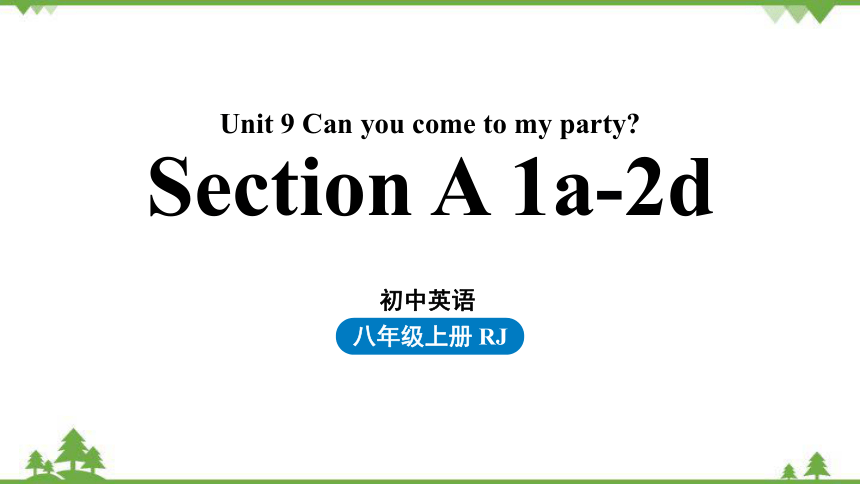 | |
| 格式 | pptx | ||
| 文件大小 | 6.4MB | ||
| 资源类型 | 教案 | ||
| 版本资源 | 人教新目标(Go for it)版 | ||
| 科目 | 英语 | ||
| 更新时间 | 2022-11-05 16:43:58 | ||
图片预览

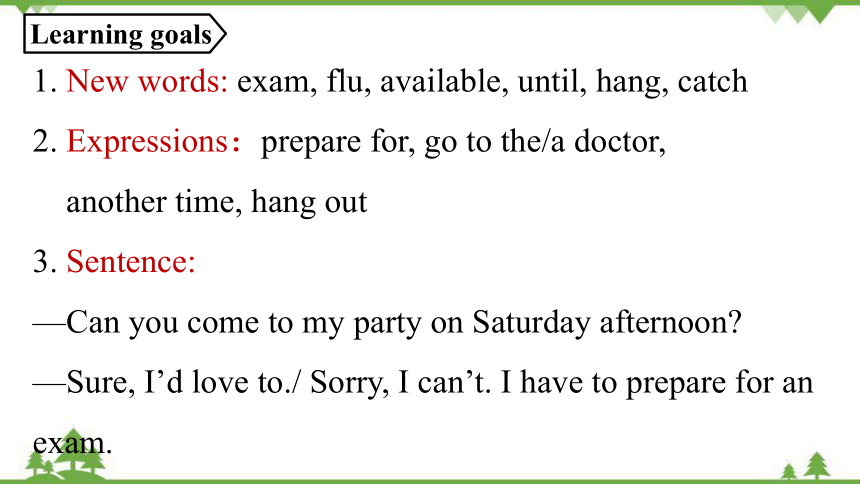
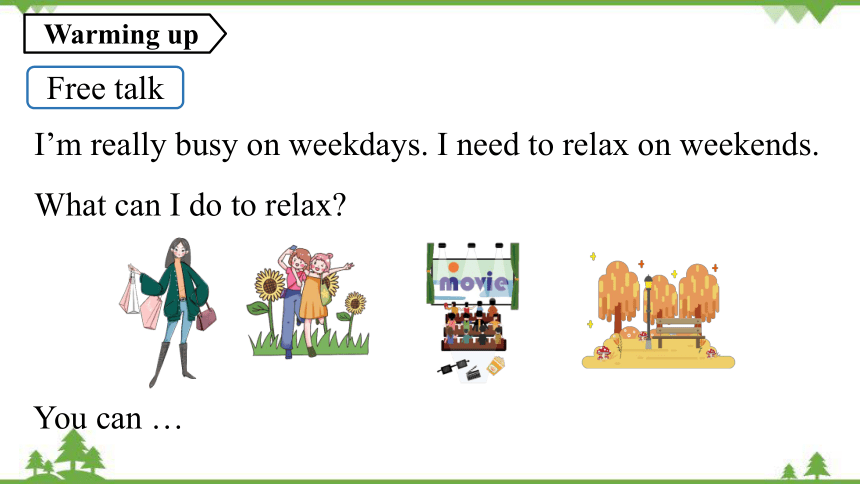
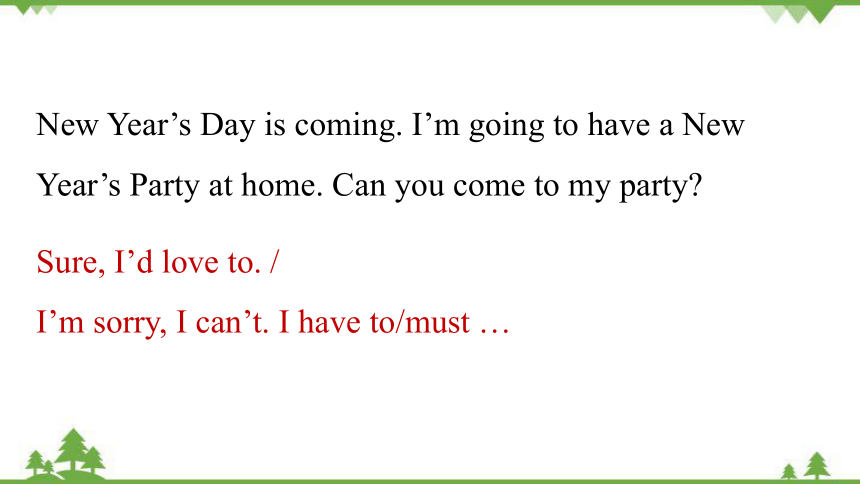
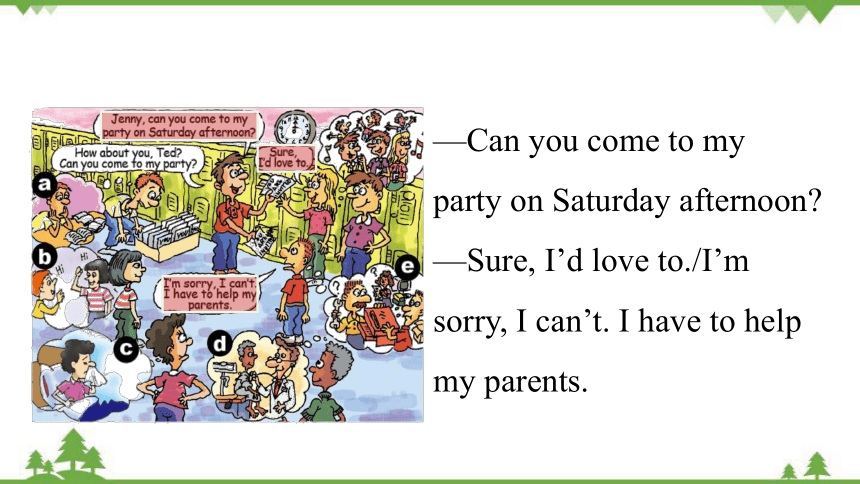
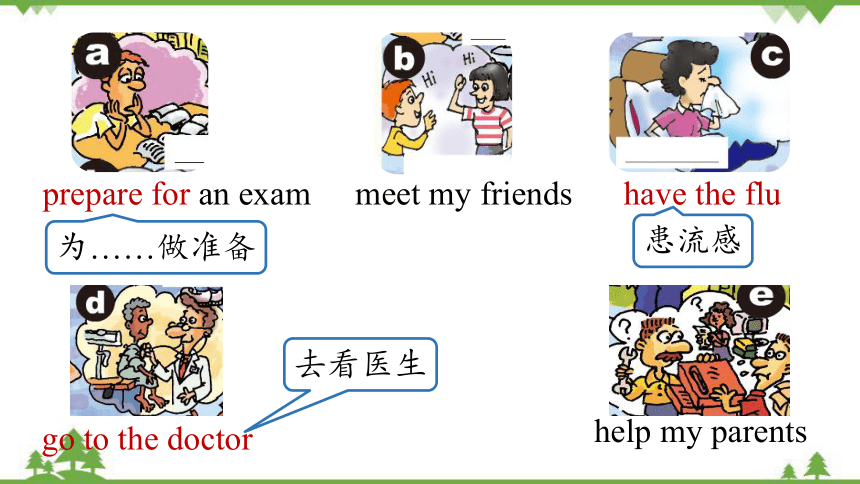
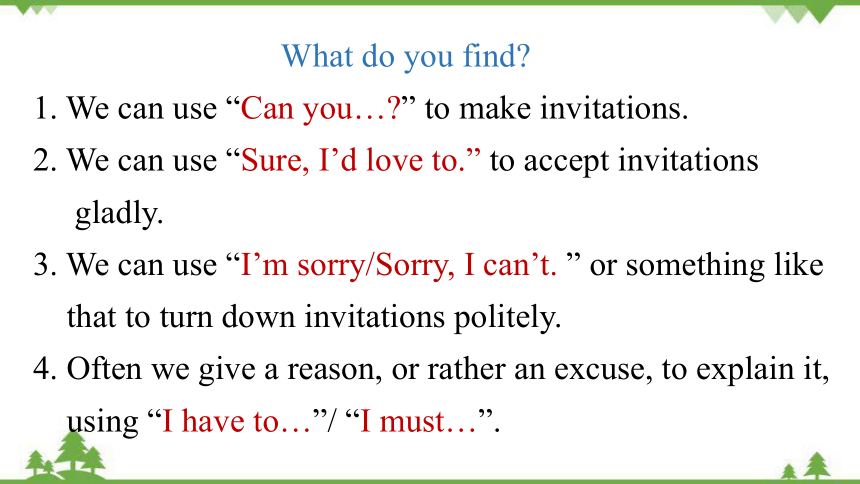
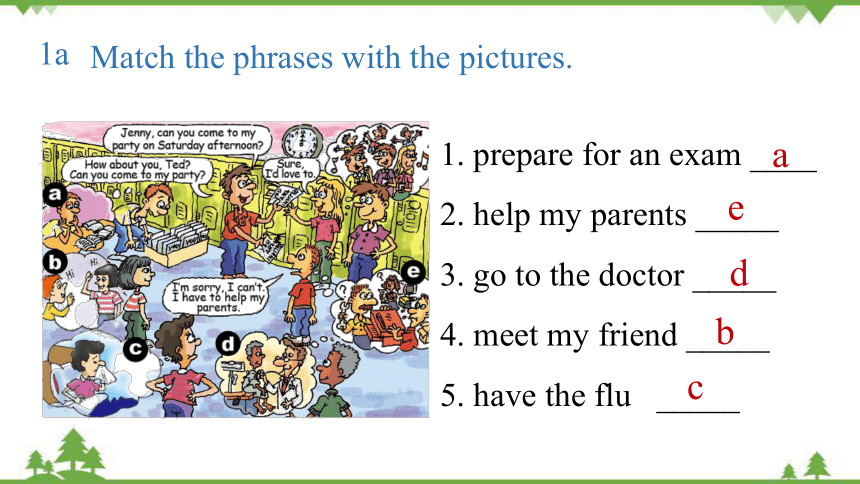
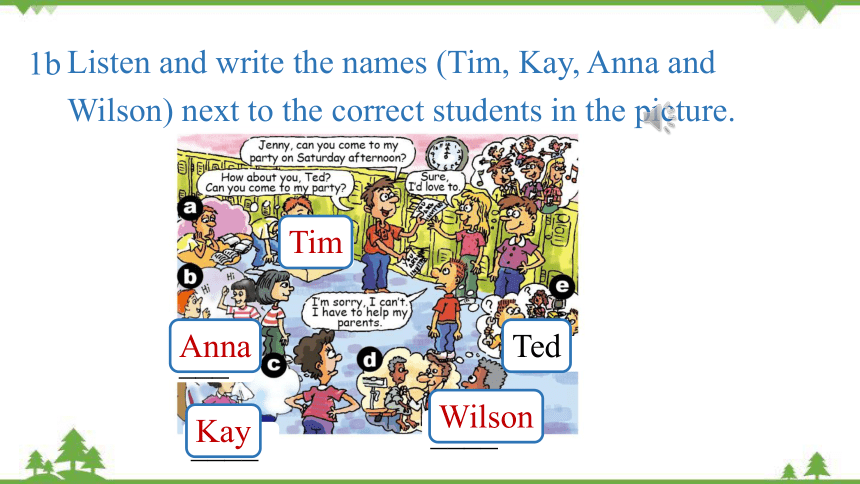
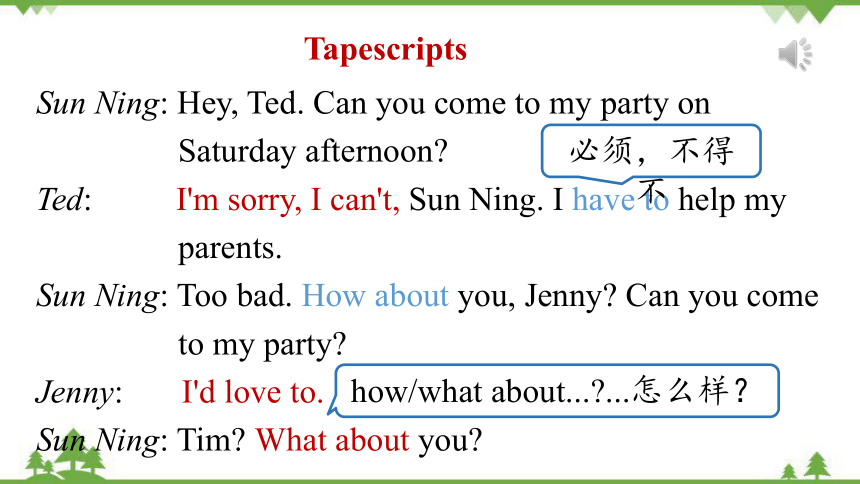
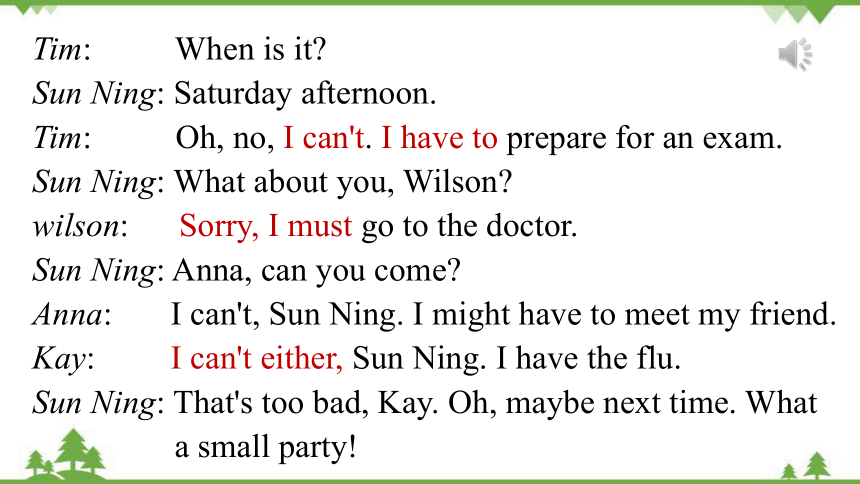
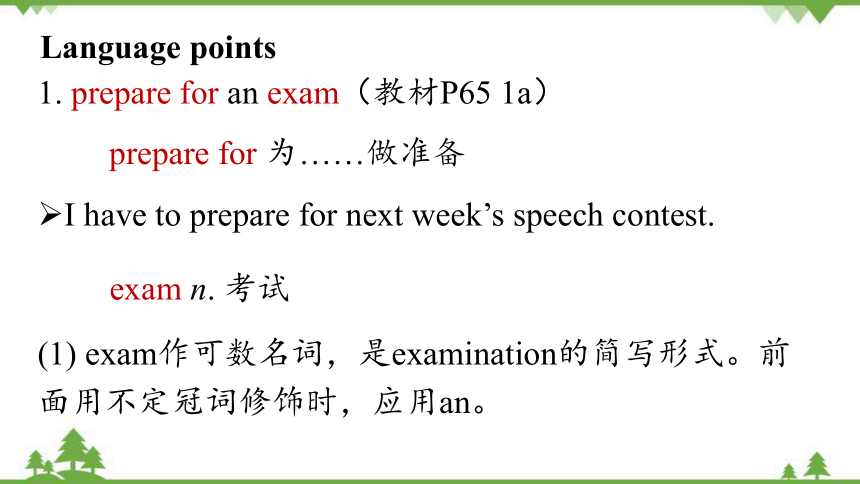
文档简介
(共48张PPT)
Section A 1a-2d
Unit 9 Can you come to my party
初中英语
八年级上册 RJ
1. New words: exam, flu, available, until, hang, catch
2. Expressions:prepare for, go to the/a doctor,
another time, hang out
3. Sentence:
—Can you come to my party on Saturday afternoon
—Sure, I’d love to./ Sorry, I can’t. I have to prepare for an exam.
Learning goals
I’m really busy on weekdays. I need to relax on weekends. What can I do to relax
You can …
Free talk
Warming up
New Year’s Day is coming. I’m going to have a New Year’s Party at home. Can you come to my party
Sure, I’d love to. /
I’m sorry, I can’t. I have to/must …
—Can you come to my party on Saturday afternoon
—Sure, I’d love to./I’m sorry, I can’t. I have to help my parents.
prepare for an exam
go to the doctor
meet my friends
have the flu
help my parents
为……做准备
患流感
去看医生
What do you find
1. We can use “Can you… ” to make invitations.
2. We can use “Sure, I’d love to.” to accept invitations
gladly.
3. We can use “I’m sorry/Sorry, I can’t. ” or something like
that to turn down invitations politely.
4. Often we give a reason, or rather an excuse, to explain it,
using “I have to…”/ “I must…”.
Match the phrases with the pictures.
1. prepare for an exam ____
2. help my parents _____
3. go to the doctor _____
4. meet my friend _____
5. have the flu _____
a
e
d
b
c
1a
____
___
Listen and write the names (Tim, Kay, Anna and Wilson) next to the correct students in the picture.
Tim
Kay
___
Anna
___
Ted
____
Wilson
1b
Sun Ning: Hey, Ted. Can you come to my party on
Saturday afternoon
Ted: I'm sorry, I can't, Sun Ning. I have to help my
parents.
Sun Ning: Too bad. How about you, Jenny Can you come
to my party
Jenny: I'd love to.
Sun Ning: Tim What about you
必须,不得不
how/what about... ...怎么样?
Tapescripts
Tim: When is it
Sun Ning: Saturday afternoon.
Tim: Oh, no, I can't. I have to prepare for an exam.
Sun Ning: What about you, Wilson
wilson: Sorry, I must go to the doctor.
Sun Ning: Anna, can you come
Anna: I can't, Sun Ning. I might have to meet my friend.
Kay: I can't either, Sun Ning. I have the flu.
Sun Ning: That's too bad, Kay. Oh, maybe next time. What
a small party!
1. prepare for an exam(教材P65 1a)
I have to prepare for next week’s speech contest.
(1) exam作可数名词,是examination的简写形式。前面用不定冠词修饰时,应用an。
prepare for 为……做准备
exam n. 考试
Language points
(2) exam相关短语有:
【易混辨析】exam与test:
exam 侧重指正式的考试,如期末考试、入学考试。 He did well in the entrance exam. 他入学考试考得很好。
test 侧重指平时进行的规模较小的测试。 He got a good mark in the test.
他在测试中取得了高分。
2. go to the doctor(教材P65 1a)
go to the/a doctor 相当于 go to see the doctor,意为“去看医生”。
He is going to the doctor because of a headache.
3. have the flu(教材P65 1a)
have the flu意为“患流感”,此处have表示“患病”的意思。类似的短语还有:
have…患…(病)
have a cold
患感冒
have a fever
发烧
have a cough
咳嗽
have a toothache
牙疼
have a sore throat嗓子痛
have a headache
头疼
You are the students in the picture. Student A, invite three students to your party. Students B, C and D, give answers.
A: Can you come to my party on Saturday afternoon
B: Sure, I’d love to.
C: Sorry, I can’t. I have to prepare for an exam.
D: I’m sorry, too. I must go to the doctor.
1c
1. Jeff can/ can’t go to the party.
2. Mary can/ can’t go to the party.
3. May can/ can’t go to the party.
4. Mei Ling can/ can’t go to the
party.
5. Paul can/ can’t go to the party.
Listen and circle can or can’t.
2a
Names Reasons
Jeff
May
Mei Ling
2b Listen again. Who can’t go to the party Why Complete the chart.
He might have to meet his friend.
She has the flu.
She must study for a math test.
抓关键词或重点短语
conversation 1
Anna: Hi, Jeff! Can you come to my party on Saturday
Jeff: I'm sorry, I'm not free. I might have to meet my
friend on Saturday.
conversation 2
Anna: Hello, Mary!Can you come to my party on Saturday
Mary: I'd love to. Do I need to bring anything
Anna: No, I'll buy all the food and drinks.
=I'm not available.我没有空
Tapescripts
conversation 3
Anna: May, can you come to my party tomorrow
May: I'm afraid not. I have the flu.
Anna: Oh, That's too bad. Well, drink lots of hot water and
get lots of sleep.
conversation 4
Anna: Mei Ling, can you come to my party on Saturday
Mei Ling:Sorry, but I'm not available. I must study for a
math test.
Anna: OK, Good luck!
祝你好运!
为…而学习
conversation 3
Anna: Hey, Paul, can you come to my party tomorrow
Paul: Sure. It sounds great. When will it start
Anna: Around 6:00 p.m. See you then.
Paul: See you.
How to refuse invitations
How to accept invitations
I’m sorry, I’m not free.
I’m afraid not. I have the flu.
Sorry, but I’m not available.
Sure. It sounds great.
I’d love to.
(Conversation1)
(Conversation3)
(Conversation4)
(Conversation5)
(Conversation2)
2c Look at the reasons in the chart in 2b. Write some more. Then, Student A, invite your partner to do something. Student B, say you can’t go and why.
1. ________________________
2. ________________________
3. ________________________
4. ________________________
too much homework
Study for an English test
look after my little sister
visit grandparents
A: Hey, Dave. Can you go to the movies on Saturday
B: I’m sorry. I’m not available. I have too much homework this weekend.
A: That’s too bad. Maybe another time.
B: Sure, Joe. Thanks for asking.
因……而感谢
下次;以后
去看电影
4. I’m not available.(教材P66 2c)
(1) available在此处意为“有空的”,与free意思相同,常在句中作表语。
We are available tonight. Let’s go for a walk.
(2) available还可意为“可获得的;可用的”。
Tickets are available from the box office(售票处).
available adj. 有空的;可获得的
Language points
【拓展】 常用来表示拒绝的方式还有:
Sorry, but I can’t. 对不起,我不能。
Sorry, I’m not free/available. 对不起,我没有时间。
I’m afraid… 我恐怕……
5. I’d love to come, but I’m afraid I can’t.(教材P66 2c)
I’d love to, but …意为“我愿意,但是……”,用来表示委婉地拒绝对方的邀请,其中不定式符号to不能省略。
— Would you like to show it to me
— I’d love to, but I’m a little busy now.
5. I’d love to come, but I’m afraid I can’t.(教材P66 2c)
I’m afraid … 表示“我恐怕……”,用于礼貌地说出令人不快、失望或感到遗憾的事。常用I’m afraid so“恐怕如此”表示肯定;用I’m afraid not “恐怕不行”表示否定。
I’m afraid (that) it’s not finished yet.
— Is it going to rain tomorrow
— I’m afraid so. / I’m afraid not.
Jeff: Hey, Nick, can you come to my
house on Saturday My cousin Sam
from Xi’an is going to be here.
Nick: Oh, Sam! I remember we went bike riding together
last fall when he visited you.
Jeff: Yes, that’s right.
Role-play the conversation.
2d
骑自行车
Nick: I’d love to come, but I’m afraid I can’t. I have an
exam on Monday so I must prepare for it.
Jeff: That’s really too bad! Oh, but Sam isn’t leaving until
next Wednesday. Can you hang out with us on
Monday night
Nick: Sure! Catch you on Monday!
恐怕不行
闲逛;常去某处
周一见
1. Can Nick go to Jeff’s house on Saturday
No, he can’t.
2. Why or why not
Because he must prepare for Monday’s exam.
3. Will the friends meet at last
Yes, they will meet on Monday night.
Answer to the following questions by reading 2d
6. Oh, but Sam isn’t leaving until next Wednesday.(教材P66 2d)
(1) until在本句中作介词,其用法有:
①与延续性动词连用,表示动作或状态一直持续到
某时为止。
②与短暂性动词连用,常用于否定句,与not构成 not … until结构,表示“直到……才”。
until conj. & prep. 到……时;直到……为止
Language points
watch TV
(延续性)
go to sleep
(短暂性)
I watched TV until 11 o’clock last night.
I didn't go to sleep unitl 11 o'clock last night.
(2) until作连词,表示动作、状态一直延续到另一动作或状态出现。
They try again and again until they succeed.
We have to wait until the light turns green.
7. Can you hang out with us on Monday night (教材P66 2d)
My brother likes reading and he often hangs out at the bookshop.
We seldom hang out at weekends recently.
hang out 闲逛;常去某处
I hung the picture on the wall.
He was hanged during the war.
【拓展】 hang的用法:
8. Catch you on Monday.(教材P66 2d)
(1) catch作动词,过去式为caught,意为“及时赶上;接住;抓住”。
Be quick, or we’ll fail to catch the school bus.
Can you catch the ball in one hand
catch you常用于口语,意为“再见:回头见”,相当于see you。
(2) catch还可意为“感染上”。catch a cold“患感冒”。
(3) catch的相关短语:
catch up with 跟上,赶上;catch one’s eye 引起某人注意
As long as I work hard, I have to be able to catch up with you.
Today, I wore a new suit. Catch classmates' eyes.
1. (2020·天水中考)They didn't go home they
finished their work.
A. after B. until C. at D. before
2.(2020.梧州中考) —Could you come to my party on Tuesday evening
— .But I'm busy studying for my test.
A. I’d love to B. How come
C. Don't mention it D. That's all right.
一、单项选择
B
Exercises
A
3. — Hi, Jack. Would you like to come to my birthday party next Friday
— I’d love to. But I’m not . I’m leaving for Beijing on that day.
A. believable B. enjoyable
C. available D. unbelievable
C
4.(2020·云南中考)—Excuse me. Where is the nearest hotel
—Just go down this road you see a library. It's across from it.
A. because B. after C. when D. until
5. On the first day of the Spring Festival, people wearing new clothes.
A. hung up B. hung back C. hung out D. hung on
D
C
1. This evening I’m studying for the math e_______.
2. Mr. Li is a__________ in the afternoon, and you can meet him then.
3. Look! My mom is p________ for the dinner in the kitchen.
4. They didn’t ______ (赶上) the last bus, so they took a taxi home.
5. I don’t feel very well today. I’m afraid I have the _____ (流感).
二、单词填空
xam
vailable
reparing
catch
flu
1. ——周六下午你能来参加我的聚会吗?
——当然,我愿意去。
__________________________________________
__________________________________________
2. 我得准备考试。
__________________________________________
3. 太糟糕了。那下次吧。
__________________________________________
三、英汉互译
—Can you come to my party next Saturday afternoon
—Sure, I’d love to.
I have to prepare for the exam.
That’s too bad. Maybe another time.
4. Sam isn’t leaving until next Wednesday.
__________________________________________
5. Can you hang out with us on Monday night
__________________________________________
6. Catch you on Monday.
__________________________________________
萨姆要一直待到下周三才离开。
周一晚上你能跟我们一起逛逛吗?
周一见 。
Key words
exam, flu, available, until, hang, catch, prepare
Useful expressions
prepare for, go to the/a doctor, another time,
hang out, I’d love to, but…, not … until
Summary
—Can you come to my party on Saturday afternoon
—Sure, I’d love to./ Sorry, I can’t. I have to prepare for an exam.
Sentences
1. Read and recite the new words and 2d.
2. Make a conversation between you and one of your classmates. In the conversation, you’ll have to talk about:
1) Make an invitation to your party;
2) Accept or decline the invitation and give reasons.
Homework
THANKS
谢谢聆听!
Section A 1a-2d
Unit 9 Can you come to my party
初中英语
八年级上册 RJ
1. New words: exam, flu, available, until, hang, catch
2. Expressions:prepare for, go to the/a doctor,
another time, hang out
3. Sentence:
—Can you come to my party on Saturday afternoon
—Sure, I’d love to./ Sorry, I can’t. I have to prepare for an exam.
Learning goals
I’m really busy on weekdays. I need to relax on weekends. What can I do to relax
You can …
Free talk
Warming up
New Year’s Day is coming. I’m going to have a New Year’s Party at home. Can you come to my party
Sure, I’d love to. /
I’m sorry, I can’t. I have to/must …
—Can you come to my party on Saturday afternoon
—Sure, I’d love to./I’m sorry, I can’t. I have to help my parents.
prepare for an exam
go to the doctor
meet my friends
have the flu
help my parents
为……做准备
患流感
去看医生
What do you find
1. We can use “Can you… ” to make invitations.
2. We can use “Sure, I’d love to.” to accept invitations
gladly.
3. We can use “I’m sorry/Sorry, I can’t. ” or something like
that to turn down invitations politely.
4. Often we give a reason, or rather an excuse, to explain it,
using “I have to…”/ “I must…”.
Match the phrases with the pictures.
1. prepare for an exam ____
2. help my parents _____
3. go to the doctor _____
4. meet my friend _____
5. have the flu _____
a
e
d
b
c
1a
____
___
Listen and write the names (Tim, Kay, Anna and Wilson) next to the correct students in the picture.
Tim
Kay
___
Anna
___
Ted
____
Wilson
1b
Sun Ning: Hey, Ted. Can you come to my party on
Saturday afternoon
Ted: I'm sorry, I can't, Sun Ning. I have to help my
parents.
Sun Ning: Too bad. How about you, Jenny Can you come
to my party
Jenny: I'd love to.
Sun Ning: Tim What about you
必须,不得不
how/what about... ...怎么样?
Tapescripts
Tim: When is it
Sun Ning: Saturday afternoon.
Tim: Oh, no, I can't. I have to prepare for an exam.
Sun Ning: What about you, Wilson
wilson: Sorry, I must go to the doctor.
Sun Ning: Anna, can you come
Anna: I can't, Sun Ning. I might have to meet my friend.
Kay: I can't either, Sun Ning. I have the flu.
Sun Ning: That's too bad, Kay. Oh, maybe next time. What
a small party!
1. prepare for an exam(教材P65 1a)
I have to prepare for next week’s speech contest.
(1) exam作可数名词,是examination的简写形式。前面用不定冠词修饰时,应用an。
prepare for 为……做准备
exam n. 考试
Language points
(2) exam相关短语有:
【易混辨析】exam与test:
exam 侧重指正式的考试,如期末考试、入学考试。 He did well in the entrance exam. 他入学考试考得很好。
test 侧重指平时进行的规模较小的测试。 He got a good mark in the test.
他在测试中取得了高分。
2. go to the doctor(教材P65 1a)
go to the/a doctor 相当于 go to see the doctor,意为“去看医生”。
He is going to the doctor because of a headache.
3. have the flu(教材P65 1a)
have the flu意为“患流感”,此处have表示“患病”的意思。类似的短语还有:
have…患…(病)
have a cold
患感冒
have a fever
发烧
have a cough
咳嗽
have a toothache
牙疼
have a sore throat嗓子痛
have a headache
头疼
You are the students in the picture. Student A, invite three students to your party. Students B, C and D, give answers.
A: Can you come to my party on Saturday afternoon
B: Sure, I’d love to.
C: Sorry, I can’t. I have to prepare for an exam.
D: I’m sorry, too. I must go to the doctor.
1c
1. Jeff can/ can’t go to the party.
2. Mary can/ can’t go to the party.
3. May can/ can’t go to the party.
4. Mei Ling can/ can’t go to the
party.
5. Paul can/ can’t go to the party.
Listen and circle can or can’t.
2a
Names Reasons
Jeff
May
Mei Ling
2b Listen again. Who can’t go to the party Why Complete the chart.
He might have to meet his friend.
She has the flu.
She must study for a math test.
抓关键词或重点短语
conversation 1
Anna: Hi, Jeff! Can you come to my party on Saturday
Jeff: I'm sorry, I'm not free. I might have to meet my
friend on Saturday.
conversation 2
Anna: Hello, Mary!Can you come to my party on Saturday
Mary: I'd love to. Do I need to bring anything
Anna: No, I'll buy all the food and drinks.
=I'm not available.我没有空
Tapescripts
conversation 3
Anna: May, can you come to my party tomorrow
May: I'm afraid not. I have the flu.
Anna: Oh, That's too bad. Well, drink lots of hot water and
get lots of sleep.
conversation 4
Anna: Mei Ling, can you come to my party on Saturday
Mei Ling:Sorry, but I'm not available. I must study for a
math test.
Anna: OK, Good luck!
祝你好运!
为…而学习
conversation 3
Anna: Hey, Paul, can you come to my party tomorrow
Paul: Sure. It sounds great. When will it start
Anna: Around 6:00 p.m. See you then.
Paul: See you.
How to refuse invitations
How to accept invitations
I’m sorry, I’m not free.
I’m afraid not. I have the flu.
Sorry, but I’m not available.
Sure. It sounds great.
I’d love to.
(Conversation1)
(Conversation3)
(Conversation4)
(Conversation5)
(Conversation2)
2c Look at the reasons in the chart in 2b. Write some more. Then, Student A, invite your partner to do something. Student B, say you can’t go and why.
1. ________________________
2. ________________________
3. ________________________
4. ________________________
too much homework
Study for an English test
look after my little sister
visit grandparents
A: Hey, Dave. Can you go to the movies on Saturday
B: I’m sorry. I’m not available. I have too much homework this weekend.
A: That’s too bad. Maybe another time.
B: Sure, Joe. Thanks for asking.
因……而感谢
下次;以后
去看电影
4. I’m not available.(教材P66 2c)
(1) available在此处意为“有空的”,与free意思相同,常在句中作表语。
We are available tonight. Let’s go for a walk.
(2) available还可意为“可获得的;可用的”。
Tickets are available from the box office(售票处).
available adj. 有空的;可获得的
Language points
【拓展】 常用来表示拒绝的方式还有:
Sorry, but I can’t. 对不起,我不能。
Sorry, I’m not free/available. 对不起,我没有时间。
I’m afraid… 我恐怕……
5. I’d love to come, but I’m afraid I can’t.(教材P66 2c)
I’d love to, but …意为“我愿意,但是……”,用来表示委婉地拒绝对方的邀请,其中不定式符号to不能省略。
— Would you like to show it to me
— I’d love to, but I’m a little busy now.
5. I’d love to come, but I’m afraid I can’t.(教材P66 2c)
I’m afraid … 表示“我恐怕……”,用于礼貌地说出令人不快、失望或感到遗憾的事。常用I’m afraid so“恐怕如此”表示肯定;用I’m afraid not “恐怕不行”表示否定。
I’m afraid (that) it’s not finished yet.
— Is it going to rain tomorrow
— I’m afraid so. / I’m afraid not.
Jeff: Hey, Nick, can you come to my
house on Saturday My cousin Sam
from Xi’an is going to be here.
Nick: Oh, Sam! I remember we went bike riding together
last fall when he visited you.
Jeff: Yes, that’s right.
Role-play the conversation.
2d
骑自行车
Nick: I’d love to come, but I’m afraid I can’t. I have an
exam on Monday so I must prepare for it.
Jeff: That’s really too bad! Oh, but Sam isn’t leaving until
next Wednesday. Can you hang out with us on
Monday night
Nick: Sure! Catch you on Monday!
恐怕不行
闲逛;常去某处
周一见
1. Can Nick go to Jeff’s house on Saturday
No, he can’t.
2. Why or why not
Because he must prepare for Monday’s exam.
3. Will the friends meet at last
Yes, they will meet on Monday night.
Answer to the following questions by reading 2d
6. Oh, but Sam isn’t leaving until next Wednesday.(教材P66 2d)
(1) until在本句中作介词,其用法有:
①与延续性动词连用,表示动作或状态一直持续到
某时为止。
②与短暂性动词连用,常用于否定句,与not构成 not … until结构,表示“直到……才”。
until conj. & prep. 到……时;直到……为止
Language points
watch TV
(延续性)
go to sleep
(短暂性)
I watched TV until 11 o’clock last night.
I didn't go to sleep unitl 11 o'clock last night.
(2) until作连词,表示动作、状态一直延续到另一动作或状态出现。
They try again and again until they succeed.
We have to wait until the light turns green.
7. Can you hang out with us on Monday night (教材P66 2d)
My brother likes reading and he often hangs out at the bookshop.
We seldom hang out at weekends recently.
hang out 闲逛;常去某处
I hung the picture on the wall.
He was hanged during the war.
【拓展】 hang的用法:
8. Catch you on Monday.(教材P66 2d)
(1) catch作动词,过去式为caught,意为“及时赶上;接住;抓住”。
Be quick, or we’ll fail to catch the school bus.
Can you catch the ball in one hand
catch you常用于口语,意为“再见:回头见”,相当于see you。
(2) catch还可意为“感染上”。catch a cold“患感冒”。
(3) catch的相关短语:
catch up with 跟上,赶上;catch one’s eye 引起某人注意
As long as I work hard, I have to be able to catch up with you.
Today, I wore a new suit. Catch classmates' eyes.
1. (2020·天水中考)They didn't go home they
finished their work.
A. after B. until C. at D. before
2.(2020.梧州中考) —Could you come to my party on Tuesday evening
— .But I'm busy studying for my test.
A. I’d love to B. How come
C. Don't mention it D. That's all right.
一、单项选择
B
Exercises
A
3. — Hi, Jack. Would you like to come to my birthday party next Friday
— I’d love to. But I’m not . I’m leaving for Beijing on that day.
A. believable B. enjoyable
C. available D. unbelievable
C
4.(2020·云南中考)—Excuse me. Where is the nearest hotel
—Just go down this road you see a library. It's across from it.
A. because B. after C. when D. until
5. On the first day of the Spring Festival, people wearing new clothes.
A. hung up B. hung back C. hung out D. hung on
D
C
1. This evening I’m studying for the math e_______.
2. Mr. Li is a__________ in the afternoon, and you can meet him then.
3. Look! My mom is p________ for the dinner in the kitchen.
4. They didn’t ______ (赶上) the last bus, so they took a taxi home.
5. I don’t feel very well today. I’m afraid I have the _____ (流感).
二、单词填空
xam
vailable
reparing
catch
flu
1. ——周六下午你能来参加我的聚会吗?
——当然,我愿意去。
__________________________________________
__________________________________________
2. 我得准备考试。
__________________________________________
3. 太糟糕了。那下次吧。
__________________________________________
三、英汉互译
—Can you come to my party next Saturday afternoon
—Sure, I’d love to.
I have to prepare for the exam.
That’s too bad. Maybe another time.
4. Sam isn’t leaving until next Wednesday.
__________________________________________
5. Can you hang out with us on Monday night
__________________________________________
6. Catch you on Monday.
__________________________________________
萨姆要一直待到下周三才离开。
周一晚上你能跟我们一起逛逛吗?
周一见 。
Key words
exam, flu, available, until, hang, catch, prepare
Useful expressions
prepare for, go to the/a doctor, another time,
hang out, I’d love to, but…, not … until
Summary
—Can you come to my party on Saturday afternoon
—Sure, I’d love to./ Sorry, I can’t. I have to prepare for an exam.
Sentences
1. Read and recite the new words and 2d.
2. Make a conversation between you and one of your classmates. In the conversation, you’ll have to talk about:
1) Make an invitation to your party;
2) Accept or decline the invitation and give reasons.
Homework
THANKS
谢谢聆听!
同课章节目录
- Unit 1 Where did you go on vacation?
- Section A
- Section B
- Unit 2 How often do you exercise?
- Section A
- Section B
- Unit 3 I'm more outgoing than my sister.
- Section A
- Section B
- Unit 4 What's the best movie theater?
- Section A
- Section B
- Unit 5 Do you want to watch a game show?
- Section A
- Section B
- Unit 6 I'm going to study computer science.
- Section A
- Section B
- Unit 7 Will people have robots?
- Section A
- Section B
- Unit 8 How do you make a banana milk shake?
- Section A
- Section B
- Unit 9 Can you come to my party?
- Section A
- Section B
- Unit 10 If you go to the party, you'll have a grea
- Section A
- Section B
